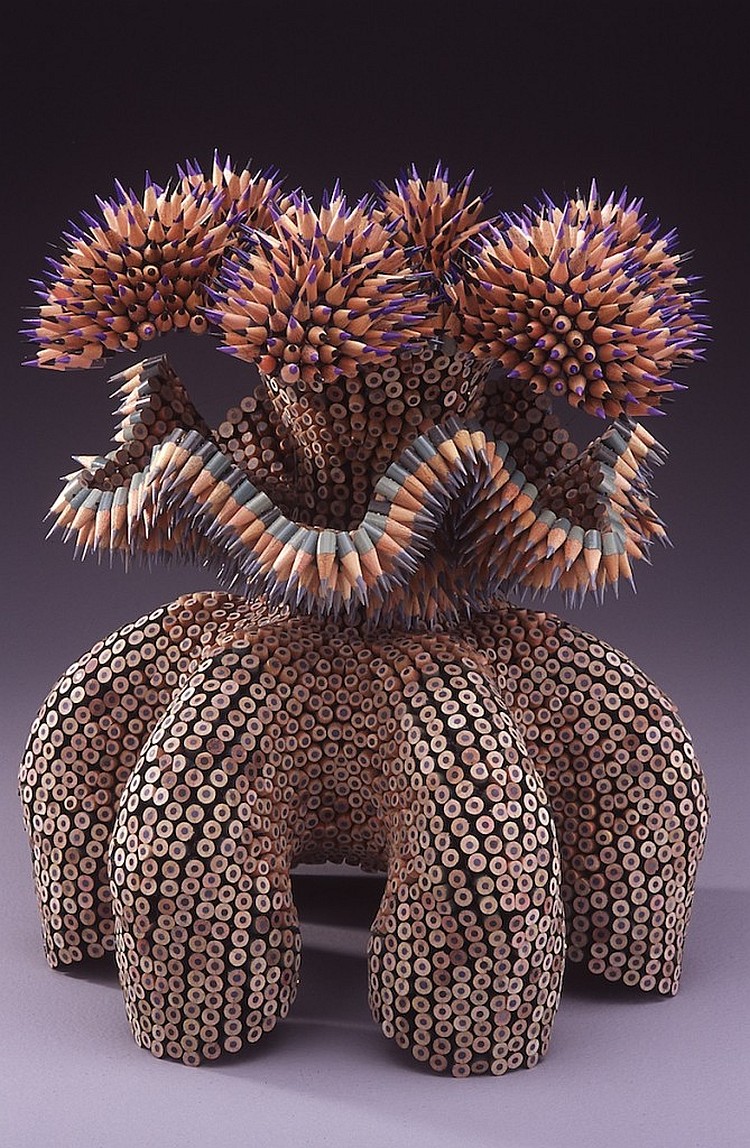Quizá muchos de ustedes conozcan el vistoso y original trabajo de Jennifer, pero creo que merece un espacio en la colección de artistas de "El Hurgador", así que aquí les dejo una selección de sus creaciones y un breve apunte sobre su vida y obra.
Perhaps many of you already know the colorful and original work of Jennifer, but I think it deserves a place in the collection of artists from "El Hurgador", so here you have a selection of her creations and a brief note on his life and work.
Jennifer Maestre
Jennifer Maestre nació en Johanesburgo (Sudáfrica). Durante su niñez, su familia viajó y vivió en varios países. Se graduó en el Wellesley College y obtuvo una licenciatura en Bella Artes (BFA) del Massachusetts College of Art.
Actualmente vive en una pequeña ciudad de Massachusetts, en EE. UU. Su estudio queda cerca de su casa, en un viejo edificio de escuela.
Jennifer comenzó a realizar sus esculturas con lápices en 1999. Aunque también trabaja con otros materiales (clavos por ejemplo), es su trabajo con lápices lo que le ha dado reconocimiento internacional.
.jpg)
"Cycad B"
"Imp", 10,5" x 7,5" x 6"
"Mis esculturas se inspiraron originalmente en la forma y función del erizo de mar. Las espinas del erizo de mar, tan peligrosas como bellas, sirven como una advertencia explícita ante el contacto. La seductora textura de las espinas invita al contacto a pesar de las posibles consecuencias. La tensión desvelada, sentimos la pulsión de tirar y empujar, deseo y repulsión. Las secciones de lápices presentan aspectos de dureza y suavidad para dos muy diferentes experiencias texturales y estéticas. La paradoja y la sorpresa son esenciales en mi elección de los materiales. Cantidad de objetos de manufactura industrial son utilizados para crear formas flexibles que evocan formas orgánicas de animales y naturaleza. Los lápices son objetos comunes; aquí éstos objetos anónimos se convierten en estructura. Hay una auténtica fragilidad en el a veces brutal aspecto de las esculturas; vulnerabilidad que se contradice por una textura temible." J.M.
Izq./ Left: "Chimera", 21" x 12" x 12" - Der./ Right: "3 to 1 Twist", 17" x 10" x 10"
"Aurora", 7" x 7" x 17". Colección privada
"Aurora", detalle / detail
"Para hacer las esculturas tomo cientos de lápices, los corto en secciones de 1 pulgada, perforo un agujero en cada sección (para convertirlos en abalorios), los afilo todos y los coso juntos. La técnica de que utilizo en la mayoría es la puntada peyote. Me inspiro en los animales, plantas, Ernst Haeckel, Odilon Redon, la mitología. De hecho no es fácil especificar una fuente de inspiración concreta. A veces una escultura inspira la próxima, o a veces cometo un error y eso me conduce en una nueva dirección." J. M.
"Ibentina"
"Asteridae", 5" x 24" x 24". Colección privada / Private Collection
Los textos están tomados de la declaración artística de Jennifer que puede leerse completa (en inglés) aquí.
"Kraken"
Jennifer Maestre was born in Johannesburg, South Africa. As a child, her family lived in, and traveled to, many different countries. She graduated from Wellesley College and received a Bachelor of Fine Arts (BFA) from the Massachusetts College of Art.
Currently lives in a small town in Massachusetts, in the U.S.. UU. Her study is close to his home in an old school building.
Jennifer began to make his sculptures with pencils in 1999. She also works with other materials (nails for example), but it is her pencil work which has given international recognition.
Izq./ Left: "Star Gazer" - Der./ Right: "Wet Feet"
"Threnody"
"My sculptures were originally inspired by the form and function of the sea urchin. The spines of the urchin, so dangerous yet beautiful, serve as an explicit warning against contact. The alluring texture of the spines draws the touch in spite of the possible consequences. The tension unveiled, we feel push and pull, desire and repulsion. The sections of pencils present aspects of sharp and smooth for two very different textural and aesthetic experiences. Paradox and surprise are integral in my choice of materials. Quantities of industrially manufactured objects are used to create flexible forms reminiscent of the organic shapes of animals and nature. Pencils are common objects, here, these anonymous objects become the structure. There is true a fragility to the sometimes brutal aspect of the sculptures, vulnerability that is belied by the fearsome texture." J.M.
Detalle de una de sus obras / Detail of one work.
Fotografía de / Photography by Jeanine Williams (flickr)
"Materialize", 19" x 10" x 10"
"Basilisk"
"To make the pencil sculptures, I take hundreds of pencils, cut them into 1-inch sections, drill a hole in each section (to turn them into beads), sharpen them all and sew them together. The beading technique I rely on most is peyote stitch.
I’m inspired by animals, plants, other art, Ernst Haeckel, Odilon Redon, mythology. In fact, it isn’t easy to specify particular sources of inspiration. Sometimes one sculpture will inspire the next, or maybe I’ll make a mistake, and that will send me off in a new direction." J.M.
"Luna", 8" x 11" x 11"
"Seethe", 9" x 13" x 14"
Texts are taken from Jennifer's artistic statement you can fully read here.
Is there also a brief biographic note in Wiki. You can enjoy more samples of her work in Jennifer's website.
"Flex", dimensiones variables / variable dimensions
Imágenes publicadas con autorización de la artista (¡Muchas gracias, Jennifer!)
Images published here with artist's permission (Thanks a lot, Jennifer!)
Aquí un vídeo de Jennifer trabajando / Here a video of Jennifer at work
















Muy bien logrados los cromatismos...
ResponderEliminar